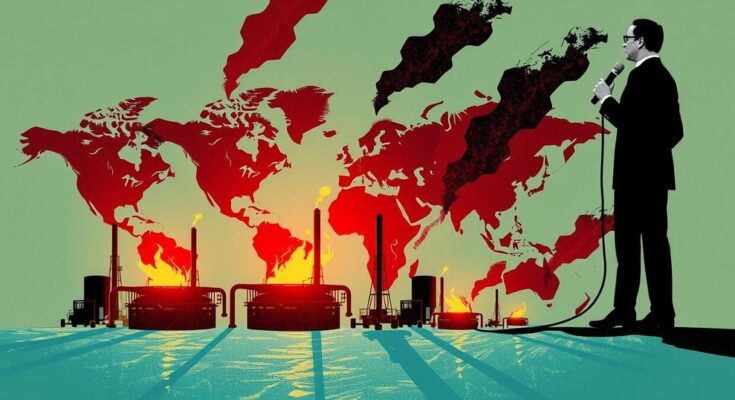The COP29 climate talks are overshadowed by the absence of significant leaders and activists, raising concerns about the effectiveness of these negotiations. The growing influence of fossil fuel lobbyists has prompted calls for reforms to exclude such interests from the discussions, as stakeholders strive for more authentic climate action. With the next conference poised to take place in Brazil, there is an urgent need to reevaluate the role of fossil fuel entities in climate discussions.
As the COP29 climate talks in Baku, Azerbaijan commenced, the absence of key global leaders and activists signified a growing disillusionment with the process, long viewed as vital in combating climate change. With the influence of fossil fuel lobbyists becoming increasingly pronounced, many are questioning the legitimacy of the discussions, urging for reforms to exclude the obstructive presence of these interests. While calls for a more effective approach to climate negotiations arise, the ongoing reliance on fossil fuels, particularly from host countries, complicates efforts for a comprehensive solution. Critics emphasize the urgent need for structural change within the UNFCCC to prioritize genuine climate action over vested interests.
The climate negotiations under the UN Framework Convention on Climate Change (UNFCCC) have, for decades, served as a platform for global collaboration to avert climate catastrophe. Past meetings, such as the Kyoto Protocol and the Paris Agreement, were milestones in establishing international commitments. However, the continuing rise in global temperatures and the prevailing influence of fossil fuel interests during these talks have led to significant skepticism regarding their effectiveness, prompting many stakeholders to advocate for reforms.
In conclusion, the COP climate meetings face a pivotal moment wherein the overwhelming presence of fossil fuel lobbyists threatens the integrity and purpose of these critical negotiations. Calls for reforms to exclude obstructors and enhance accountability are gaining traction. As the focus shifts towards the next conference in Brazil, it will be vital to address the systemic issues that allow fossil fuel interests to dominate discussions, ensuring that true climate action remains at the forefront of policy-making.
Original Source: www.corporateknights.com




